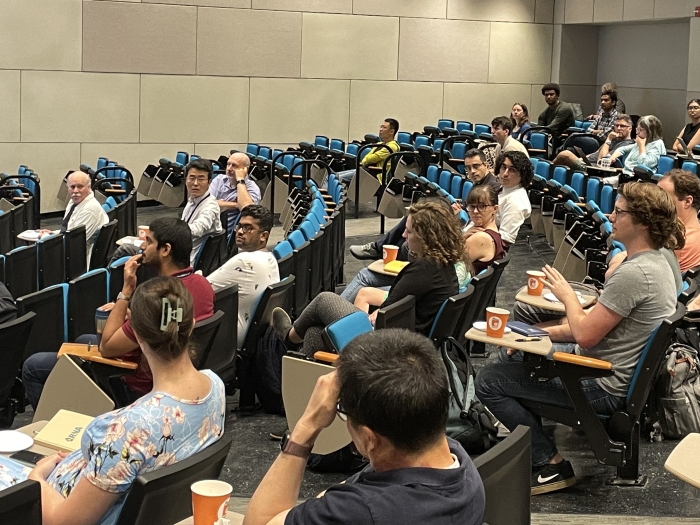
Available to mentor

Dr. Young is the William Henry Fitzbutler Collegiate Professor in the Department of Internal Medicine/Infectious Diseases Division and the Department of Microbiology & Immunology at the University of Michigan Medical School. Dr. Young has a long-standing interest in understanding the pathogenesis of bacterial infections of the gastrointestinal tract and the role of the normal microbiota in human health and disease. Current research in the Young Lab includes a “team science” effort to understand the pathogenesis Clostridium difficile infection by an integrated approach that combines clinical research, bacterial genomics, microbial ecology and immunology/host response projects. He is also leading a group of investigators that is developing the use of stem cell-derived intestinal organoids as a novel alternative model system for the study of enteric disease agents.
Young Lab twitter
-
Postdoctoral FellowMassachusetts Institute of Technology, Cambridge, 2021
-
FellowMassachusetts General Hospital, Infectious Diseases, 2001
-
ResidencyMassachusetts General Hospital, Internal Medicine, 1995
-
MD, PhDStanford University School of Medicine, 300 Pasteur Drive, 1992
-
BSMassachusetts Institute of Technology, Cambridge, 1985
-
Center MemberCaswell Diabetes Institute
Research in the Young lab is directed at understanding the role of indigenous microbiota in influencing the health status of their host. One research focus is to examine how the population structure and thus function of the gastrointestinal microbiota can influence host-pathogen interactions and how changes in the community structure of the indigenous microbiota itself can lead to pathogenic states. This research is being conducted both with material from human subjects as well as animal models of disease.
One key area of study in the lab concerns the role of the indigenous gut microbiota in antibiotic-associated diarrhea. About 20% of cases of antibiotic-associated diarrhea arise from infection with the toxin producing bacterial pathogen Clostridium difficile. Previous work has provided evidence that antibiotic-associated diarrhea, both cases due to infection with Clostridium difficile and cases independent of infection with this pathogen, results from the effect of antibiotics on the indigenous gut microbiota. In the case of antibiotic-associated diarrhea without C. difficile infection we have provided evidence that loss of the normal fermentation capacity of the microbiota results in an osmotic diarrhea as well as potential colonic epithelial dysfunction due to decreases in the levels of short-chain fatty acids, such as butyrate. Our work on recurrent C. difficile infection has demonstrated that recurrence is associated with decreases in the overall diversity of the indigenous gut microbiota. This work provides the first evidence that alteration in the community structure of the gut microbiota can lead to sustained loss of colonization resistance against bacterial pathogens. To supplement our clinical studies, we have developed a murine model of C. difficile infection that recreates most aspects of human disease and allows us to closely examine the interaction between the pathogen, the indigenous microbiota and host responses in the development of disease. Using the model we have conducted studies that have examined how disruption of the indigenous microbiota by antibiotics creates a metabolic environment that favors the germination C. difficile spores and vegetative outgrowth within the gastrointestinal tract.
To extend our work on host-microbe interactions we are employing stem cell-derived intestinal organoids to study how commensal microbes and pathogens interact with the intestinal epithelium. This flexible system allows us to examine the bidirectional interaction between microbes and the host epithelium to understand how this interaction affects both members of the symbiosis.
-
Lawrence A-LE, Berger RP, Hill DR, Huang S, Yadagiri VK, Bons B, Fields C, Knight JS, Wobus CE, Spence JR, Young VB, Abuaita BH, O'Riordan MX. mSphere, 2024 Dec 19; 9 (12): e0069324Journal ArticleNeutrophil prime unique transcriptional responses in intestinal organoids during infection with nontyphoidal Salmonella enterica serovars.
DOI:10.1128/msphere.00693-24 PMID: 39565098 -
Millard SA, Vendrov KC, Young VB, Seekatz AM. bioRxiv,PreprintHost origin of microbiota drives functional recovery and Clostridioides difficile clearance in mice
DOI:10.1101/2024.11.19.624317 -
Golob J, Rao K, Berinstein JA, Singh P, Chey WD, Owyang C, Kamada N, Higgins PDR, Young V, Bishu S, Lee AA. Inflamm Bowel Dis, 2024 Nov 14;Journal ArticleWhy Symptoms Linger in Quiescent Crohn's Disease: Investigating the Impact of Sulfidogenic Microbes and Sulfur Metabolic Pathways.
DOI:10.1093/ibd/izae238 PMID: 39541261 -
Sansom SE, Shimasaki T, Dangana T, Lin MY, Schoeny ME, Fukuda C, Moore NM, Yelin RD, Bassis CM, Rhee Y, Cisneros EC, Bell P, Lolans K, Aboushaala K, Young VB, Hayden MK. J Infect Dis, 2024 Oct 16; 230 (4): 807 - 815.Proceeding / Abstract / PosterComparison of Daily Versus Admission and Discharge Surveillance Cultures for Multidrug-Resistant Organism Detection in an Intensive Care Unit.
DOI:10.1093/infdis/jiae162 PMID: 38546721 -
Shen J, Weng Y, Shimada T, Karan M, Watson A, Medernach RL, Young VB, Hayden MK, Hartmann EM. medRxiv,PreprintHospital environments harbor chlorhexidine tolerant bacteria potentially linked to chlorhexidine persistence in the environment
DOI:10.1101/2024.10.07.24315058 -
Nhu NTQ, Lin H, Pigli Y, Sia JK, Kuhn P, Snitkin ES, Young V, Kamboj M, Pamer EG, Rice PA, Shen A, Dong Q. 2024 Sep 24;PreprintFlagellar switch inverted repeat impacts flagellar invertibility and varies Clostridioides difficile RT027/MLST1 virulence.
DOI:10.1101/2023.06.22.546185 PMID: 39386689 -
Golob J, Rao K, Berinstein JA, Singh P, Chey WD, Owyang C, Kamada N, Higgins PDR, Young V, Bishu S, Lee AA. 2024 Sep 9;PreprintWhy Symptoms Linger in Quiescent Crohn's Disease: Investigating the Impact of Sulfidogenic Microbes and Sulfur Metabolic Pathways.
DOI:10.1101/2024.09.08.24313266 PMID: 39314983 -
McDonald LC, Young VB, Wilcox MH, Halpin AL, Chaves RL. mSphere, 2024 Aug 28; 9 (8): e0041724Journal ArticlePublic health case for microbiome-sparing antibiotics and new opportunities for drug development.
DOI:10.1128/msphere.00417-24 PMID: 39092918
